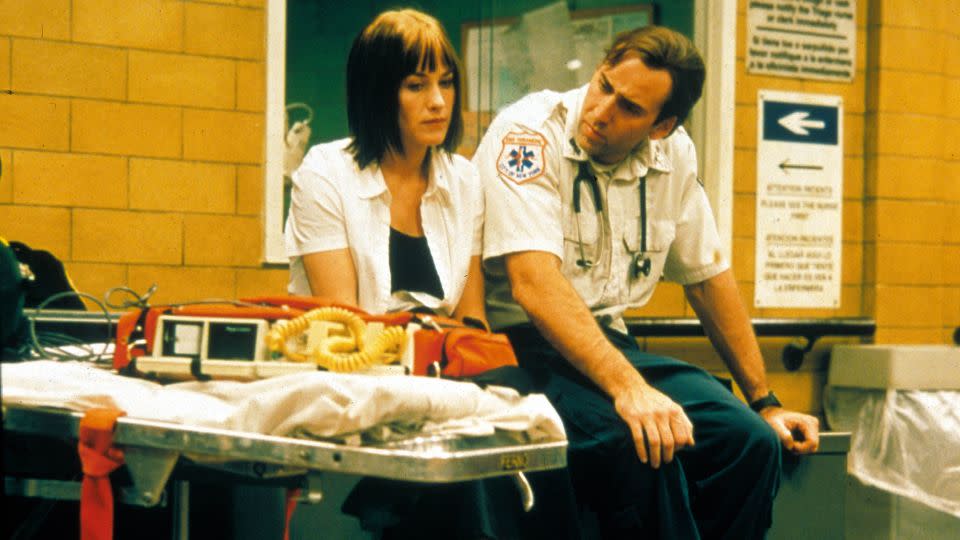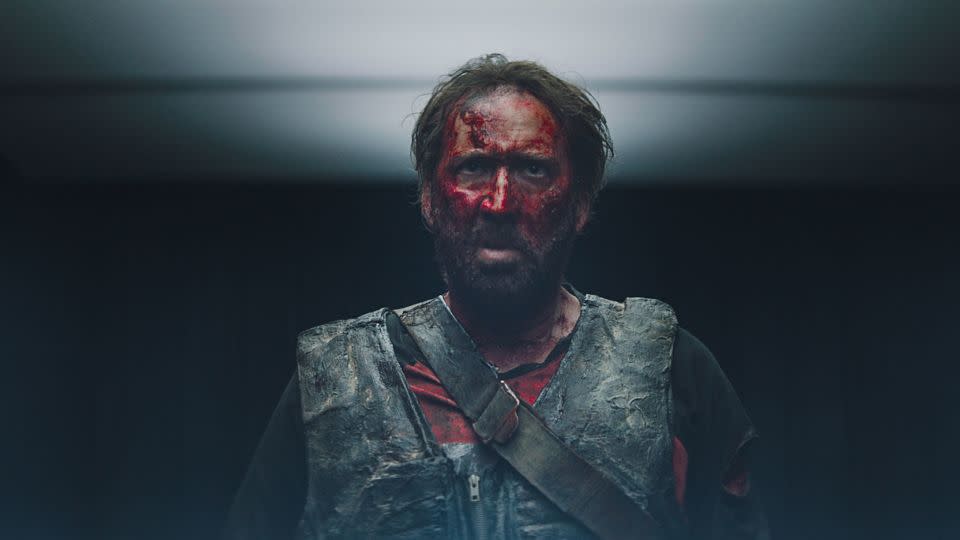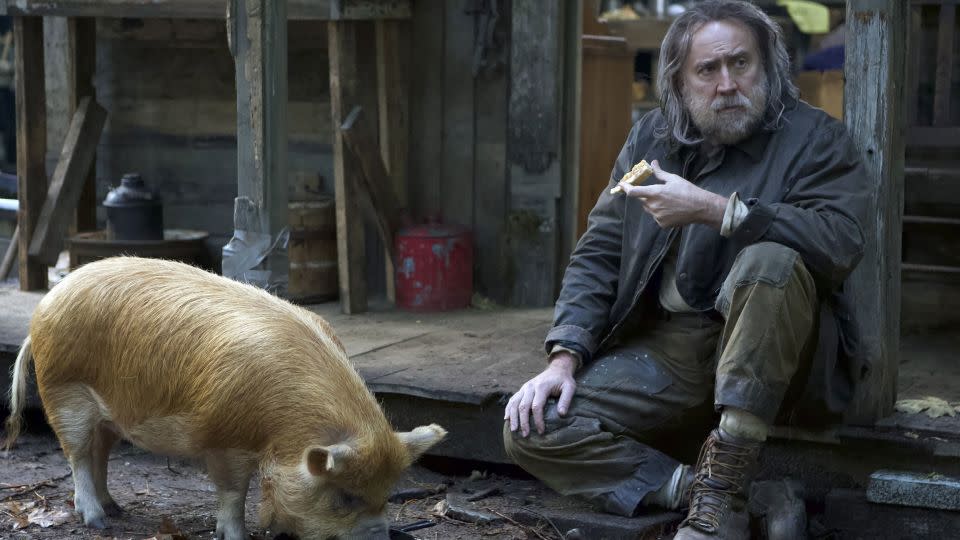We rewatched Nicolas Cage’s five favorite Nicolas Cage films. Here’s what we discovered about the enigmatic star
- Oops!Something went wrong.Please try again later.
- Oops!Something went wrong.Please try again later.
- Oops!Something went wrong.Please try again later.
Much has been written about Nicolas Cage and his contentious place in film — is he really that good or, just that bad?
There are certainly arguments to be made for both. The bizarre choices he makes in films — sudden outbursts of feeling, hyper-heightened reactions, unplaceable accents, the occasional set of false teeth — are polarizing. Many critics and cinephiles have defended his talent, especially in the shadow of acclaimed films like “Pig” in 2021 and “Dream Scenario,” a new A24 film that premieres this week. But not too long ago, many of those same film buffs believed his best days were far behind him.
Cage himself mostly remained on the outskirts of such conversations, largely written off by mainstream Hollywood and critics following a yearslong string of direct-to-video flops broken up by the occasional hidden gem. Earlier this year, though, upon the release of the middling horror-comedy “Renfield,” Cage waded into the debate with his own best-of list.
In a visit to “The Late Show with Stephen Colbert,” Cage told the host that his favorite movies he’d ever made were “Pig,” “Mandy,” “Bringing Out the Dead,” “Bad Lieutenant” and “Joe.” The films share little in common beyond Cage in starring roles — “Mandy” is an ultraviolent gonzo horror, “Pig” is a meditation on loneliness among other heady topics. But Cage sees in them his greatest performances that honor the weird, outlandish quirks for which he is known and the deep earnestness he brings to his best films.
We revisit his five favorite films ahead of “Dream Scenario,” a film for which Cage has earned glowing reviews, to reappraise his magnetic talent and unravel his enigmatic onscreen presence.
‘Bringing Out the Dead,’ 1999

Cage’s only collaboration with Martin Scorsese to date followed outsized performances in action blockbusters like “Con Air,” “The Rock” and “Face/Off.” The actor’s tendency to emote works in those films because of the fantastical worlds in which they take place — “Face/Off” is literally about Cage taking his face off and switching it with that of John Travolta. But here, in Scorsese’s gritty week-in-the-life of a New York paramedic, Cage’s breakdown is too painful to meme.
His EMT is haunted by the ghosts of the people he’s failed to save, driving deeper into despair with every dispatch. He’s overworked, underpaid and about to break, and despite his fractured sanity and the questionable decisions that result from his snowballing stress, Cage infuses empathy into a character that could’ve otherwise been a shell or fodder for an Oscar nomination. Perhaps because he’s played so many men on the verge of madness, Cage’s performance here feels far more naturalistic and nuanced. It’s all the more thrilling when he finally embraces hope after his last shift.
‘Bad Lieutenant: Port of Call New Orleans,’ 2009
The most surprising thing about this film is that it took until 2009 for Cage and director Werner Herzog, two of cinema’s great iconoclasts, to collaborate.
“Bad Lieutenant: Port of Call New Orleans” — a sort-of, not-quite remake of Abel Ferrera’s 1993 film of the same name — sees Cage as an über-crooked cop come undone. His drug-addled investigator is pretty much irredeemable — he nearly lets a prisoner drown to death in the opening minutes of the film, and he threatens to murder two older women in cold blood for information. But in the final moments of the film, he reunites with the prisoner he almost allowed to drown. That man is free and sober when he meets Cage’s Terence McDonagh again in a hotel room — and offers McDonagh a chance to end his addiction.
The two men end the film sitting on the floor of an aquarium, their backs turned to the enormous glass through which viewers watch fish and sharks swim. Animals abound in the film — there are iguanas on a coffee table that only McDonagh can see, and a gator that looks on as another gator is killed by a car on the highway. Cage’s McDonagh is one of them, too, a snake in a swamp of evil. Critics praised “Bad Lieutenant” because, finally, Cage and a crime film were on the same weird wavelength.
‘Joe,’ 2013

Cage loves a revenge thriller, and this is perhaps the film within that genre that rings most true. Cage’s eponymous character is a Southern tree poisoner who gives a job to a teen with an abusive father. Of course, we know Cage as a California-bred Italian-American Oscar winner from the esteemed Coppola clan, but here he disappears into the part about as well as Nicolas Cage can disappear into anything.
The naturalistic film, filled mostly with first-time actors, followed a string of forgettable flops like Disney’s “The Sorcerer’s Apprentice,” the sequel to “Ghost Rider” and the “Taken”-esque thriller “Stolen.” Critics were effusive about Cage’s performance: Time hailed it as a “comeback” for the oft-heralded actor, and The Guardian said Cage “carries the film.”
It worked, critics said, because it took what made Cage great in most other films — his heightened responses and extreme earnestness — and grounded it. In his review of “Joe,” The Guardian’s Peter Bradshaw remarked that Cage “possesses a sense of both the extravagant and the absurd that makes him castable in both serious pictures and comedies.”
‘Mandy,’ 2018

This surreal horror features one of Cage’s all-time greatest onscreen breakdowns — this time in his underwear with a giant bottle of vodka in hand. Cage’s lumberjack Red has witnessed his beloved partner, the titular Mandy, get burned alive in front of him by an evil cult and cannibalistic bikers. He finds himself half-naked inside a beautifully wallpapered bathroom, screaming in agony and disbelief at the shock of violence he’s been forced to endure. It’s funny at first — another addition to the “Nicolas Cage Freakout” compilations that brought him infamy for years — but quickly grows unsettling and sad, like we’re witnessing something too private to be shared onscreen.
It’s one of his most affecting performances. Red’s grief is raw and real and unavoidable, even while he’s slicing people with chainsaws and chucking their heads around like footballs. His smiles feel deranged, his shrieks triumphant. Cage is never one to take the obvious or easy route, though it’s no challenge to watch him fly so high here.
‘Pig,’ 2021

Cage told Colbert that Michael Sarnoski’s film is his favorite he’s ever made. Its logline is simple — Cage is a former chef living alone in a forest outside Portland, Oregon, with his beloved truffle-hunting pig. When his pig is taken, he returns to the culinary world he abandoned to find it.
“Pig” sent Cage back into the good graces of critics who couldn’t stomach “Mandy” or didn’t see “Joe”— here was a surprising performance, one that could’ve seen Cage return to his arsenal of wild outbursts and unhinged violence. But where he’s chaotic in “Bad Lieutenant” and unraveling in “Bringing Out the Dead,” in “Pig” he’s unpredictably ascetic, acting more quietly than we’ve ever seen onscreen.
“Pig” was especially rewarding for viewers because it felt like a new beginning for the actor. Cage paid off millions of dollars in debt during the pandemic, GQ reported last year, after years of churning out poorly received films. “Pig” was one of the first he made after he was no longer bound to that debt, and it’s one of the most unique in his filmography for how little resemblance it bears to his biggest hits — and the hope it revived in Cage.
Other Cage greatest hits
‘Moonstruck, 1987
When we are introduced to Cage’s Ronny Cammareri, he’s baking bread, dripping in sweat and threatening to kill himself. He’s a wolf, he repeatedly tells Cher’s Loretta, all passion and rage and, yes, unkempt body hair.
In the bizarre romcom world of “Moonstruck,” where luck and superstition rule and accents that defy classification abound, Cage’s exposed nerve of a performance fits right in.
‘Vampire’s Kiss,’ 1988
Cage told GQ last year that “Vampire’s Kiss” was his favorite movie he’s ever made. It’s certainly one of, if not the most meme-able film in his oeuvre: He contorts his face into expressions that resemble Halloween masks — fitting for a film about a yuppie with an unplaceable accent convinced he’s turning into a vampire.
It is one of his freest performances. Cage is never self-conscious onscreen, but before “Vampire’s Kiss,” he’d garnered acclaimed for mainstream films like “Moonstruck” and “Raising Arizona.” Perhaps he was being approached for parts for heartthrobs or traditional buff action stars after the success of those films. He opted instead to portray a dirtbag experiencing a supernatural psychotic break.
Sometimes, it doesn’t work when an actor runs away with a film or acts like he’s starring in a completely different one set in an alternate universe, but Cage’s fearless performance is why the film endures.
‘Adaptation.,’ 2003
In the Charlie Kaufman-penned, Spike Jonze-directed would-be adaptation of Susan Orlean’s “The Orchid Thief,” Cage plays twins — one talented but cripplingly neurotic and one “high on his own supply” whose success comes too easily. Cage gives heightened performances, but rarely has he been this endearingly nebbish or frustratingly arrogant — until the debut of “Dream Scenario.”
For more CNN news and newsletters create an account at CNN.com

